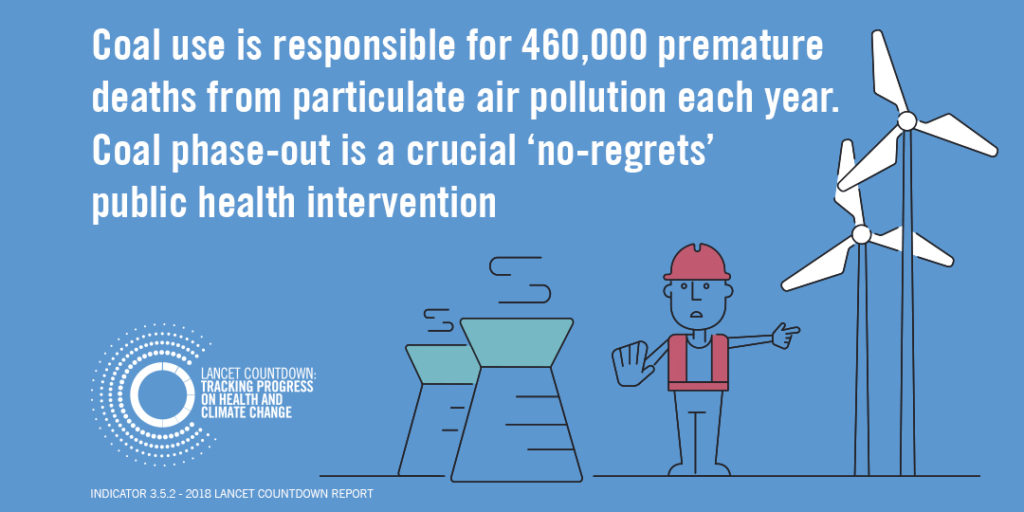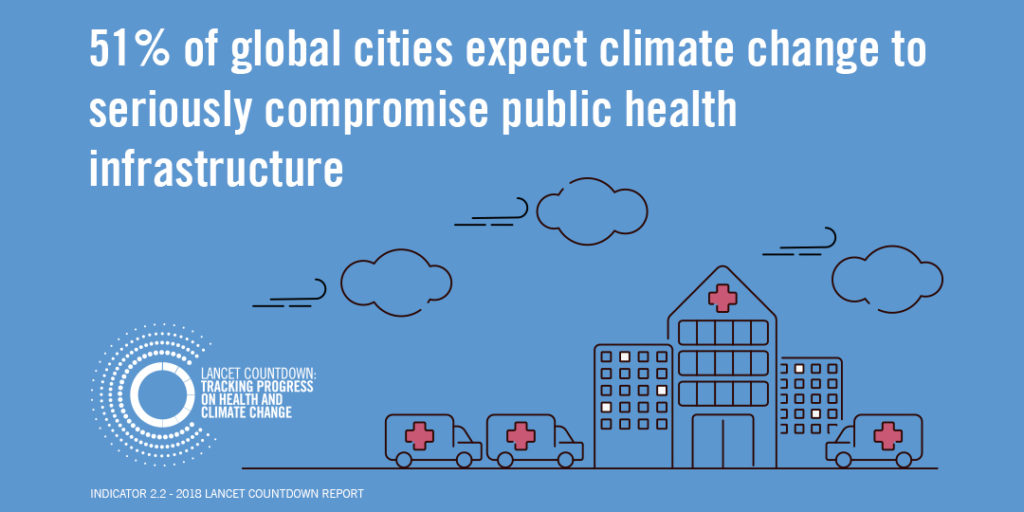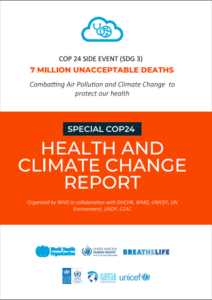Acting on climate change reaps direct health benefits, particularly in the area of air pollution, as the two share the same culprits, concluded two major reports on health and climate change released last week.
The 2018 report of the Lancet Countdown on health and climate change: shaping the health of nations for centuries to come, produced by doctors, academics and policy experts from 27 organisations around the world, measures progress towards recommendations made by the 2015 Lancet Commission on health and climate change, which include: phasing out coal-fired power, encouraging city-level low-carbon transitions, and rapidly expanding access to renewable energy.

Source: The Lancet Commission
The picture, it says, is mixed. While growth in renewable energy outstripped that in fossil fuel capacity installation last year, there were some worrying trends.
The carbon intensity of the global energy supply is exactly where it was in 1990; an entire third of the global population, 2.8 billion people, live without access to healthy, clean and sustainable cooking fuel or technology—exactly the same number of people as in 2000; per capita global road-transport fuel use has increased by 2 per cent from 2013 to 2015, and only 10 per cent of total journeys are taken by bicycle.

Source: The Lancet Commission
“The health burden of such inaction has been immense, with people in more than 90 per cent of cities breathing polluted air that is toxic to their cardiovascular and respiratory health,” says the report.
Fine particulate matter 2.5 micrograms or less, which is the size of some viruses, was responsible for 2.9 million premature deaths, with coal being responsible for more than 460,000 (16 per cent) of these deaths— so the co-benefits of phasing out coal help offset the policy costs of mitigation, the researchers concluded.
The Lancet report calls such a phase-out “a crucial no-regret intervention” for public health.
The 2018 Emissions Gap Report, also released last week, found that efforts were falling short for a reasonable chance at meeting the temperature goals of the Paris Agreement— something the Lancet report lamented meant “many near-term benefits for health, such as those from improved air quality, are still not being realised.”
“The finds of the 2018 Lancet report are clear. The stakes could not be higher. We cannot delay action on climate change. We cannot sleepwalk through this health emergency any longer,” said WHO Director-General, Dr Tedros Adhanom Ghebreyesus.
The Lancet report’s findings are echoed by the Fourth National Climate Assessment of the United States Environmental Protection Agency, which emphasized the public health and air quality impacts of more intense, frequent and prolonged wildfires promised by climate change.
As it is, the report reiterated, human-caused climate change was estimated to have doubled the area of forest burned in the western United States from 1984 to 2015— and wildfire frequency and scale of burned areas is expected to increase over the 21st century due to climate change.
Apart from being significant sources of particulate matter, wildfires and “prescribed fires” also contribute to ground-level ozone, which has been described as “sunburn for the lungs”.
“Climate change alone introduces a climate penalty (an increase in air pollution resulting from climate change for ozone) over most of the United States from warmer temperatures and increases in natural emissions,” the report stated.
Both reports stressed that climate change would erode gains won on the public health and environmental fronts.
According to Gina McCarthy, a former head of the U.S. Environmental Protection Agency now at Harvard University’s public health school, California’s recent wildfires, spurred by drought, have cost more than 80 lives and polluted air as far east as Massachusetts.
“Keep in mind that for every statistic there is a personal story,” urged Renee Salas, an emergency room doctor at Massachusetts General Hospital in the United States and an author of the report, who had recently treated a man felled by heatstroke while at work.
The hidden costs of climate change, she said, were being seen in hospitals.
The bottom line?
“Most mitigation policies are good for health – and they’re good for health now,” she said.
Read the full reports here:
2018 report of the Lancet Countdown on health and climate change: shaping the health of nations for centuries to come
Fourth National Climate Assessment
The World Health Organization is will release its Special Report on Health and Climate Change today at COP24 in Katowice, Poland.
PRESS CONFERENCE
HEALTH BENEFITS OF TACKLING CLIMATE CHANGE
LAUNCH OF WHO COP24 REPORT ON CLIMATE & HEALTH
Katowice, 5 December 2018 – In its Special COP24 on Health and Climate Change, WHO will highlight health as the biggest issue to be prioritized during COP-24 and will provide key recommendations to the negotiators on how to maximize the health benefits of tackling climate change and avoid the worse health impacts of this global challenge.
Although there has been hugely positive progress in tackling health and climate change issues, there is a still a long way to go. Millions of people are still exposed to air pollution globally, resulting in 7 million premature deaths every year; 3 billion people still lack access to clean and reliable energy; and nearly a quarter of all deaths worldwide result from people having to live or work in unhealthy environments. Unless significant changes are made and stronger action taken, we are risk of failing to meet the targets of the Paris Agreement and the SDGs.
Speakers:
Maria Neira, Director, Department of Public Health, Environmental and Social Determinants of Health, World Health Organization.
Diarmid Campbell-Lendrum, Coordinator, Department of Public Health, Environmental and Social Determinants of Health, World Health Organization
Kristie Ebi, Professor, Departments of Global Health and Environmental and Occupational Health Sciences, University of Washington and lead author, Global Warming of 1.5 °C, IPCC special report on the impacts of global warming.
WHEN: 12h00-12h30 Wednesday 5 December 2018
WHERE: Press Conference Room Katowice, area F
LIVESTREAM: For the livestream of the COP24 Health press event:
https://unfccc-cop24.streamworld.de/upcoming
The press conference will be followed by a side event: 7 million unacceptable deaths – Special COP24 Health and Climate Change Report.
